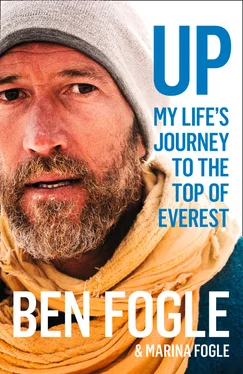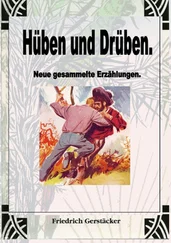It had been many years since I climbed in crampons with ropes and harness. It was like becoming a student again as Kenton taught us the basics of rope work and how to plant our crampons in the ice. Testament to my climbing inexperience were the tattered, torn hems of my climbing trousers, where the sharp blades of the crampons had slashed through the material.
For 10 days we yomped, trekked, hiked and climbed across the Andean peaks until we reached our final challenge, Illimani. Victoria had struggled with the food and had been suffering from an upset stomach, but Kenton felt confident that we had the strength, stamina and resolve for our first 6,500-metre peak. After all, this was the main event. This was what we had come halfway around the world for. Leaving without an ascent would not only have felt like failure but also bad karma for our ultimate goal, Everest – more than two vertical miles higher.
I was halfway up the mountain when I got the call from Dad.
‘It’s Mum,’ he said. ‘She’s in the ICU in an induced coma.’
The call came as a bolt from the blue. Why now, when I was stuck on the other side of the world?
I felt as helpless as I was clueless. I didn’t know what to do. My instinct was to drop everything and head home as quickly as possible, but that was easier said than done when you are clinging to an icy mountain in the isolated nation of Bolivia.
Dad explained that Mum had fallen ill after a routine injection. The needle had pierced an artery and she had bled internally for 12 hours until she passed out. The hospital had placed her in an induced coma. She had a tracheostomy tube cut into her neck and she was in the intensive care unit, being cared for by four nurses, day and night.
‘I’m coming home,’ I told Dad.
‘There’s nothing you can do,’ he reassured me, ‘she’s unconscious, she won’t even know who’s there.’
If all went well, we would summit the following day and I would be home within three days.
‘She would want you to continue,’ he added.
It was a knife-edge decision. My instinct was to head straight home, but even I could see the pointlessness of returning to a mother who was in an induced coma. Things weren’t good, but Dad’s reassuring tone implied that she was in the best hands and that three days wouldn’t make a difference. I still don’t know if I made the right decision, but I decided to carry on. Dad had implored me. He told me it was what Mum would have wanted me to do.
At midnight, we packed up our rucksacks and headed off for our first big summit together. Under torchlight we trudged and zig-zagged up the snowy, icy flanks of Illimani. She was a brute to climb. Starved of oxygen, cold and hungry, we battled on until dawn when the mountain was illuminated pink. The power of that sunrise was incredible. I could feel the sun charge my energy – it felt like new batteries had been placed inside me.
The three of us marched on in silence. Heads bowed to the mountain, each of us in our own misery. The suffering on a high mountain is largely invisible. It is the nakedness of that suffering that makes it harder to grasp. You end up hating yourself and beating yourself up for feeling as you do.
It is completely unlike running a marathon in which the physical drain is obvious. Here, the exhaustion is invisible. It creeps up on you and renders you useless. It is impossible to fight it; you simply have to endure it. Suffer it and deal with it.
‘That’s it,’ came an exclamation from Victoria, ‘I’m out.’
It was 6.30 am and we were just a few metres from the summit. Kenton and I were incredulous. She had endured more than six hours of climbing and hardship, only to declare her quitting a matter of minutes from the summit. It was as unexpected as it was illogical, but then mountains have a strange effect on people. Irrationality is the norm and unreasonable behaviour becomes commonplace. It is one of the reasons solo mountaineering is so dangerous. Without another perspective, it’s difficult to gauge right from wrong. Kenton’s surprise soon turned to exasperation.
‘Get some bloody food in you,’ he berated her. ‘You have no energy because you haven’t eaten anything.’
She had ‘bonked’, as the cycling term refers to it. She had used up her reserves and was running on empty. Kenton was right, but I could tell she didn’t like his style. Victoria is not at all precious, but she has also spent her post-Olympic years trying to exorcise the ghosts of always being told what to do. She popped some nuts into her mouth and less than 20 minutes later we summited the highest peak that Victoria or I had ever climbed.
The summit was bittersweet. We had succeeded, but my mind and focus were elsewhere, back in Britain, worrying about my mother. The expedition had also opened a slight rift between Victoria and Kenton.
I spent the next few months visiting my mother’s bedside each day. Slowly, she recovered and three months later she was discharged from hospital. She had defied the odds, and not only could she walk – something my father had warned us might not be possible – but she also had control of all her senses.
Meanwhile, Victoria was worried about the expedition. She had been unimpressed with Kenton’s slightly laissez-faire approach. His lack of headtorch and failure to pack a satellite phone had rankled her. It had bothered me too, but I’d put it down to a one-off error.
Victoria is a harsher critic and I had to try and convince her that not only was Kenton still the man for the job, but also that Everest was still the right challenge for us.
We had both struggled in Bolivia. Victoria had displayed worrying physiological stats and had struggled in the thin air at 6,500 metres, the same height as Camp 1 on Everest. We would be going several vertical miles higher.
Bolivia had been my first real mountain test. It had pushed me physically, but I had also been inadvertently pushed mentally – worrying about both Victoria and my mother. I am a worrier. I wish I wasn’t, but I am. I worry about everything. Worry and guilt are my two worst traits.
I’m one of those people that never really enjoys a party I host, because I’m so busy worrying about whether my guests are having a good time and guilty that they have made the effort to come to the party in the first place.
I often feel guilty. There is often no sensible or rational reason for it. I had always been worried (there we go again) that I would worry about Victoria. I felt a guilty responsibility for her being in the mountains in the first place, even though our decision to try and climb Everest had been very much a collaborative one.
Taking on Mount Everest was a massive task. We had to want it, but we also had to enjoy it. There was no point taking two years out of our lives, and the sacrifices that come with that, to climb one of the most dangerous mountains in the world, if we didn’t really enjoy it.
Life is way too short to spend that amount of time doing something you aren’t really committed to. I got the impression that Victoria had already dedicated enough of her life to cycling, which had never really been her passion. She had simply gone with the ride and discovered she was pretty good at it. She had impressed Kenton with her stamina and mental drive in Bolivia, but she hadn’t impressed herself. We had both seen her ability to beat herself up. But I wanted Victoria to persevere. I could see the life-changing beauty that lay ahead for her, if only she would embrace the challenge.
Our second training expedition would take us into the heart of Nepal and the Himalayas. Kenton wanted to get us used to the high mountains of the Everest region, to introduce us to the food, the sherpas, the equipment and the landscape in which we would spend upwards of two months in our ultimate quest.
Читать дальше












